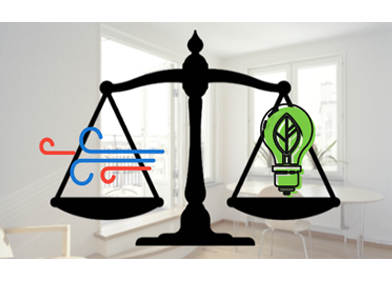HVAC Ventilation vs. Energy Conservation
Balancing Energy Conservation and HVAC Ventilation
The oil embargo in 1973 forever changed attitudes about the way Americans used energy. At the time, it was quite common for office buildings to leave all of the lights in the building on 24/7—even over the weekend. When the Middle East oil supply was turned off, conserving energy began in earnest.
Energy efficiency became a major focus, from the power plant to the household appliance. We cool and warm our homes using energy-saving principles.1
In recent years, another concern is grabbing the headlines: Americans are saving energy to impact climate change. The goal is to reduce energy production from processes that burn fossil fuels, reducing the amount of CO2 released into the atmosphere.
Both reducing energy and reducing your carbon footprint result in increased energy efficiency and reduced cost for heating and cooling.
One of the principles of energy efficiency includes closing windows and doors and sealing gaps that allow outside air to leak into our homes. However, it is important not to sacrifice one principle—ventilation—for another principle—energy efficiency.
Here are some reasons to remember about HVAC Ventilation:
Unwanted Gases
With each breath, we convert oxygen into carbon dioxide. One of the chief reasons to build ventilation into the HVAC Ventilation system is to constantly remove carbon dioxide and replace it with fresh air. The lack of fresh air would lead to headaches, fatigue, and restlessness.
Many everyday items release gases called volatile organic compounds (VOCs); most of these off-gases result from the manufacturing process. VOCs are given off my furniture, flooring, and paint. However, ventilation is important to remove VOCs from the home, since they can cause irritation of the eyes, throat, and lungs.
Long-term exposure can result in damage to the liver and the nervous system. Removing VOCs from your indoor spaces is another important need for ventilation.
Excess Moisture in Your HVAC Ventilation
Normal human activity produces significant amounts of moisture. Cooking, cleaning, bathing, and even breathing release moisture into the air. For these reasons, it is common to find exhaust fans in kitchens and bathrooms.
Your concerns about energy efficiency might lead you to reduce the use of exhaust fans or avoid using them altogether. However, they provide a needed function, removing moisture that can lead to mold, mildew, or bacteria growth. The exhaust fan will draw outside air inside to replenish the supply, reducing the amount of moisture in specific locations.
Microbes
For the last two years, we have been educated concerning the reasons behind the increase of colds and flu during wintertime; we even call it “cold and flu season.” When cold weather arrives we:
- Spend more time inside and
- Using energy-efficient principles, we close our homes and office spaces to stay warm.
This concentrates the number of airborne viruses in a given space.
Health officials encourage periodically bringing fresh air into indoor spaces to dilute the number of microbes. Current models encourage running ceiling or HVAC Ventilation fans to increase the air exchange rate. If you intentionally open up your house during the occasional warm winter day, you can combine both HVAC Ventilation and energy efficiency methods.
Need help with HVAC Ventilation?
Let us know how we can help with improving your HVAC Ventilation, call AllCool AC & Heating at 281-238-9292 or contact us via email.
1 https://www.nytimes.com/2017/01/27/science/arthur-rosenfeld-dead-energy-efficiency.html
